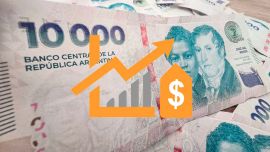Sergio Moro, the ex-judge behind 'Operação Lava Jato' ("Operation Car Wash"), the biggest corruption crack-down in Brazilian history, has officially stepped into the political arena.
The former justice minister joined a centrist political party Wednesday and said he was weighing a run in presidential elections next year.
Moro, who sent a laundry list of political heavyweights and business executives to jail as lead judge in an investigation into massive corruption at state-run oil company Petrobras, held a press conference in Brasilia to announce he had joined the Podemos party and was eying the 2022 polls.
“The country is on the wrong path,” Moro said in Brasilia. He talked about the high level of unemployment, how the fight against corruption lost steam, as well as rising consumer prices and interest rates.
"If it's necessary to lead that project, my name will always be available to the Brazilian people," Moro said. "There are other good names that have been presented to help the country escape these two extremes of lying, corruption and backsliding. But I won't shrink from that fight, even though I know it will be difficult."
The 49-year-old anti-corruption crusader's name has been floated as a potential "third-way" candidate in what is shaping up to be a heavyweight showdown next October between far-right President Jair Bolsonaro and the biggest figure of all jailed by Moro, leftist ex-president Luiz Inácio Lula da Silva.
But Moro trails well behind both in opinion polls, and would face a crowded field of other contenders if he decides to enter the race. Nearly a dozen people are already jockeying for the centrist vote, including the governors of São Paulo, João Doria, and Rio Grande do Sul, Eduardo Leite.
Former health minister Luiz Henrique Mandetta, another member of the administration who parted ways with the president on bad terms, is also trying to become a viable centrist candidate. He participated in this morning’s ceremony, posing for pictures with Moro.
Although not a candidate yet, news of Moro’s political affiliation starts to lay the groundwork for an operatic twist to the 2022 Brazilian election: that the same judge who sent Lula to prison could years later face him at the polls.
Nevertheless, Moro's brand has been damaged since he quit the Judiciary to become Bolsonaro's justice minister in 2019. The move fuelled the arguments of critics on the left who said Lava Jato was more about political persecution than fighting graft.
The damage only increased when internal communications from the operation were leaked to the media that appeared to show Moro and investigators conspiring to keep Lula (2003-2010) from staging a comeback in Brazil's 2018 presidential race.
Moro, who appeared on stage at an auditorium adorned with banners reading "A fair Brazil," later had a falling-out with Bolsonaro and quit the government in April 2020, accusing the president of interfering in police investigations targeting his inner circle, including family members.
Polls give Moro less than 10 percent of the vote in October 2022, compared to 26 percent for Bolsonaro and 44 percent for Lula.
The former judge is viewed by many Brazilians as the country’s star corruption fighter, and he may inherit disillusioned Bolsonaro voters. But his record is not sterling: this year the Supreme Court ruled that he had been biased in the proceedings against Lula, who in 2019 was released from jail on appeal.
Jailed in 2018, then released in 2019 pending appeal, Lula was cleared to run for election again when the Supreme Court annulled his corruption convictions on procedural grounds last April.
In his speech, Moro highlighted the fight against corruption and criticized the administrations of both Lula and Bolsonaro.
He broadly covered themes such as the economy, the environment and diversity. He defended a tax reform, the privatisation of state-owned companies and the search for external markets. Without going into details, he named poverty eradication as a priority he intended to tackle through a taskforce.
“Our sense of community prevents us from adopting a blind capitalism, without solidarity or compassion,” said Moro. Inserting religion into his speech, he added, “Our sense of justice, our Christian values that are shared by other religions, demand that the great economic inequalities be overcome.”
– TIMES/AFP/BLOOMBERG




















Comments